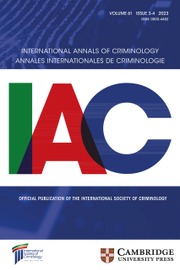Article contents
Policing the COVID-19 Outbreak, Accounts of Misconduct, and the Imperatives of Procedural Justice Training for Nigerian Police Officers
Published online by Cambridge University Press: 07 September 2023
Abstract
Globally, questions have been asked on how police utilized additional powers created to manage the spread of the COVID-19 virus without negatively impacting police legitimacy. This was particularly a concern in countries that had hitherto recorded high incidents of police misconduct prior to the emergence of the pandemic. Using a victim-centered approach, a qualitative study was conducted to examine the dimensions of unlawful use of force, human rights violations, and other police misconduct which prevailed during the enforcement of the COVID-19 lockdown in Nigeria. In all, 82 interviews with victims of police violence were conducted, and a thematic analysis of the narratives was carried out. Findings indicate negative perceptions of police legitimacy to intervene in public health crises. In building better community relations that will engender public compliance with police directives, the police authority is advised to purge itself of its militarized system, with officers undergoing procedural justice training and imbibing its principles.
Abstracto
A nivel mundial, se han formulado preguntas sobre cómo la policía utilizó los poderes adicionales creados para gestionar la propagación del virus COVID-19 sin afectar negativamente la legitimidad policial. Esto fue particularmente preocupante en países que hasta ahora habían registrado un alto número de incidentes de conducta policial indebida antes del surgimiento de la pandemia. Con un enfoque centrado en las víctimas, se realizó un estudio cualitativo para examinar las dimensiones del uso ilegal de la fuerza, las violaciones de los derechos humanos y otras malas conductas policiales que prevalecieron durante la aplicación del confinamiento por la COVID-19 en Nigeria. Se realizaron 82 entrevistas a víctimas de violencia policial y se realizó un análisis temático de las narrativas. Los hallazgos indican percepciones negativas de la legitimidad policial para intervenir en crisis de salud pública. Para construir mejores relaciones comunitarias que generen el cumplimiento público de las directivas policiales, se aconseja a la autoridad policial que se purgue de su sistema militarizado, con oficiales que reciben capacitación en justicia procesal e internalizan sus principios.
Abstrait
À lʼéchelle mondiale, des questions ont été posées sur la manière dont la police a utilisé les pouvoirs supplémentaires créés pour gérer la propagation du virus COVID-19 sans nuire à la légitimité de la police. Cela était particulièrement préoccupant dans les pays qui avaient jusquʼà présent enregistré de nombreux cas d’inconduite policière avant lʼémergence de la pandémie. En utilisant une approche centrée sur les victimes, une étude qualitative a été menée pour examiner les dimensions de l’usage illégal de la force, des violations des droits de l’homme et d’autres fautes policières qui ont prévalu lors de l’application du confinement lié au COVID-19 au Nigéria. Quatre-vingt-deux entretiens avec des victimes de violences policières ont été menés et une analyse thématique des récits a été réalisée. Les résultats indiquent des perceptions négatives de la légitimité de la police à intervenir dans les crises de santé publique. Pour construire de meilleures relations communautaires qui engendreront le respect par le public des directives de la police, il est conseillé à l’autorité policière de se purger de son système militarisé, avec des agents suivant une formation à la justice procédurale et intériorisant ses principes.
抽象的
在全球范围内,人们对警察如何利用额外权力来管理 COVID-19 病毒的传播而不会对警察的合法性产生负面影响提出了疑问。 对于在大流行出现之前警察不当行为事件频繁发生的国家来说,这一点尤其令人担忧。 采用以受害者为中心的方法,进行了一项定性研究,以审查尼日利亚实施 COVID-19 封锁期间普遍存在的非法使用武力、侵犯人权和其他警察不当行为的严重程度。 对警察暴力受害者进行了 82 次访谈,并对叙述进行了专题分析。 调查结果表明人们对警察干预公共卫生危机的合法性持负面看法。 为了建立更好的社区关系,使公众遵守警察指令,建议警察当局清除军事化系统,让警官接受程序正义培训并将其原则内化。
خلاصة
على الصعيد العالمي ، تم طرح أسئلة حول كيفية استخدام الشرطة للسلطات الإضافية التي تم إنشاؤها لإدارة انتشار فيروس COVID-19 دون التأثير سلبًا على شرعية الشرطة. وكان هذا مصدر قلق بشكل خاص في البلدان التي سجلت حتى الآن حوادث عالية لسوء سلوك الشرطة قبل ظهور الوباء. باستخدام نهج يركز على الضحية ، تم إجراء دراسة نوعية لفحص أبعاد الاستخدام غير القانوني للقوة ، وانتهاكات حقوق الإنسان ، وغيرها من سوء سلوك الشرطة الذي ساد أثناء إنفاذ إغلاق COVID-19 في نيجيريا. وأجريت 82 مقابلة مع ضحايا عنف الشرطة ، وأجري تحليل مواضيعي للروايات. تشير النتائج إلى تصورات سلبية عن شرعية الشرطة للتدخل في أزمات الصحة العامة. لبناء علاقات مجتمعية أفضل من شأنها أن تولد امتثالًا عامًا لتوجيهات الشرطة ، تُنصح سلطة الشرطة بتطهير نفسها من النظام العسكري ، مع خضوع الضباط للتدريب على العدالة الإجرائية واستيعاب مبادئها.
Keywords
- Type
- Article
- Information
- Copyright
- © International Society of Criminology, 2023
References
- 2
- Cited by




